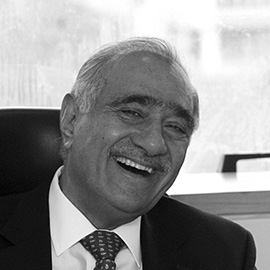
This is not the first time the relationship between India and Pakistan has hit a low. It is, in fact, part of a typical cycle of brief highs and extended lows. Unfortunately, we take one step forward and two steps back; even from a mathematical perspective, the overall movement is backwards. The troubling question is: how far can this regression continue?
This high-low pattern will most likely have unintended consequences that neither side seems to realise. Whenever the relations hit a serious low, as is the case today, the conversation - if indeed it can be called a conversation - is laced with threats, counter-threats and brinkmanship. The rhetoric of the Indo-Pak relationship reminds me of the trailer of some cheap Bollywood or Lollywood movie featuring dialogues that are abusive, offensive and laced with threats. India, because of its growing military and political muscle, focuses less on compromise and more on intimidation. Pakistan, owing to its growing insecurity, also relies on threatening holocaust. Couple this with the growing religiosity in both countries, and irrational decisions seem to receive divine approval.
Also Read: A moderate Modi and stable Sharif can mend Indo-Pakistan ties
Another feature of the Indo-Pak relationship is that it's event driven and reactive. Even today, the relationship is very poor because of the ongoing turmoil in Kashmir. This turmoil, I believe, is the result of ill-considered policy decisions made by Delhi. Pakistan, of course, wasted no time in raising the issue of Delhi's inhuman treatment of Kashmiris on various international forums. India reacted immediately and accused Pakistan of violating human rights in Balochistan, Gilgit-Baltistan and the Pakistani Kashmir.
Regretfully, today the foreign policies of both countries are focused on one-upmanship and trying to outsmart each other, with very little thought given to improving the relationship. It appears that the intelligence establishments are driving foreign policy on both sides, a very dangerous tendency.
For decades, enlightened members of the civil society in both countries have been offering, through Track II engagement, suggestions and formulations to help our two governments move forward and develop a lasting peace. But nothing seems to work.
Finding a way
The cost of resigning and letting our countries stumble as before is too great. So, here is another modest offer of a few pointers that can form the contours of a way forward.
With Kashmiris in the lead, both India and Pakistan need to take immediate steps to arrest the raging violence in India Controlled Kashmir. The ruling party in the Indian part of Kashmir has already devised an initiative, which this needs to be positively followed up, by both India and Pakistan. The heavy lifting will have to be done by Delhi, while Islamabad will have to resist fishing in troubled waters.
Both India and Pakistan need to focus on nationalism based on culture, language and race, and less on religion. The rise of Islamic nationalism in Pakistan and the rise of Hindu nationalism in India will cause instability in both countries.
Also Read: Theatre of the Absurd: why the NSA talks were bound to fail
Foreign policy formulation of both countries should be left to political leaderships and the diplomats. Security and intelligence agencies should be limited to performing their traditional roles and not dictate foreign policy.
Since nuclear parity has limited the possibility of a conventional war in South Asia, both India and Pakistan are using other covert instruments of national power to destabilise each other. Both countries need to make an open commitment to work towards ensuring stability of each other - therein lie the seeds of regional peace. Eminent thinkers and scholars in both countries are convinced that stability is a fundamental prerequisite for moving towards prosperity, of not only India and Pakistan but the whole region.
Kashmir remains the primary cause of tension between India and Pakistan. A fair solution that ensures a better future for the people of Kashmir will, in the long run, serve the national interests of India and Pakistan. The two countries have fought several wars on Kashmir, yet failed to resolve the issue - maybe it's time we seek the assistance of a third party or the UN.
From decades of experience in both India and Pakistan, I'm convinced that the overwhelming populations of the two countries want peaceful coexistence and friendship with each other. It is the negative mindset of the establishments that has stroked mistrust and animosity. Let the people decide their fate and future. The easiest way to let that happen is to fully liberalise the visa regime and encourage movement of common citizens across the borders. The political leaderships need to ignore the paranoia of the security and intelligence agencies and let common sense lead the way.
Both our countries have, from time to time, made commitments of ushering in enduring peace, but failed to follow through for one reason or the other. It would be very appropriate if the prime ministers make a joint single-point declaration that: "We will not destabilise each other by any act, covert or overt. We will not interfere in the internal affairs of each other and we will jointly work towards the betterment of the people of our two nations and the South Asia region."
Also Read: Kashmir: Invoking Vajpayee won't cut it anymore, Mr Modi. You must act
First published: 29 August 2016, 6:43 IST







![BJP's Kapil Mishra recreates Shankar Mahadevan’s ‘Breathless’ song to highlight Delhi pollution [WATCH] BJP's Kapil Mishra recreates Shankar Mahadevan’s ‘Breathless’ song to highlight Delhi pollution [WATCH]](https://images.catchnews.com/upload/2022/11/03/kapil-mishra_240884_300x172.png)

![Anupam Kher shares pictures of his toned body on 67th birthday [MUST SEE] Anupam Kher shares pictures of his toned body on 67th birthday [MUST SEE]](https://images.catchnews.com/upload/2022/03/07/Anupam_kher_231145_300x172.jpg)






